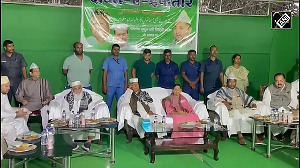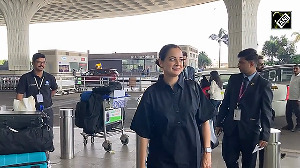The Bharatiya Janata Party which returned to power in Delhi after 26 years with a decisive mandate has its task cut out: it will have to fulfil key election promises, continue welfare schemes of the previous government, fix the city's pollution and infrastructure issues, and deliver on cleaning the Yamuna.

The BJP government will have to get all this done while keeping a check on the financial health of the national capital.
The Aam Aadmi Party, which will now be in the opposition, will also be breathing down its neck given it has never been out of power in Delhi since its formation.
In the recently concluded 70-member Delhi assembly elections, the BJP secured a decisive victory with 48 seats, while the AAP won 22 seats ending AAP's decade-long rule in the capital.
Among the top priorities of Rekha Gupta, who was chosen by the party to be the chief minister, will be to deliver on its promise of providing a monthly honorarium of Rs 2,500 to women of Delhi. This was a key commitment in the party's manifesto and was designed to outmatch AAP's pledge of Rs 2,100.
Prime Minister Narendra Modi, addressing a rally in Dwarka on February 1, had assured that the decision to transfer the amount would be taken in the first cabinet meeting if the BJP came to power.
The AAP has already raised doubts about the BJP's commitment to paying the honorarium, with outgoing chief minister Atishi this Friday said she would hold the new government accountable.
Another major challenge for the BJP will be to continue welfare schemes initiated by the AAP government, including free electricity up to 200 units, free water connection and free bus rides for women, among others.
While the BJP has assured voters that these benefits will not be discontinued, AAP leaders have questioned the party's long-term commitment.
During campaigning for the recent assembly polls, PM Modi and Union Home Minister Amit Shah reassured voters that free schemes would continue but "corruption" in such programmes would be eliminated.
The BJP also has to implement its own flagship programmes in Delhi. The BJP had promised to introduce the Ayushman Bharat health insurance scheme in Delhi and it had become an electoral issue.
The scheme provides free treatment up to Rs 5 lakh per beneficiary, with an additional Rs 5 lakh covered by the state government. The AAP government had previously refused to implement it, claiming that Delhi's existing healthcare system was superior and more inclusive.
The BJP has also vowed to reform Delhi's Mohalla Clinics, alleging corruption in its functioning. BJP MLA Manjinder Singh Sirsa from Rajouri Garden said that the clinics will be rebranded as "Ayushman Arogya Mandirs" and will deliver better healthcare delivery.
BJP has consistently accused the AAP of corruption, alleging that it was deliberately trying to avoid the tabling of the Comptroller and Auditor General (CAG) reports in the assembly to hide financial irregularities.
Delhi BJP president Virendra Sachdeva has said all pending CAG reports will be tabled and all corruption charges will be investigated thoroughly.
Among the two main allegations of corruption against the AAP were in the 'Sheesh Mahal' controversy and the liquor policy case.
The cleaning of the Yamuna was a major issue during the BJP's campaign.
As the BJP cornered the AAP over failing to clean the river in its decade-long rule, Kejriwal alleged that the BJP-led Haryana government was polluting the river with "poisonous ammonia".
Prime Minister Modi, during the BJP's victory celebrations, after it won the February 5 polls, reaffirmed his commitment to cleaning the river.
The administration has begun deploying trash skimmers, weed harvesters, and dredgers for the clean-up operation along the 57-km stretch of the Yamuna in Delhi.
Additionally, the BJP government will be under pressure to improve Delhi's deteriorating roads and sewage system. Poor infrastructure was a major voter concern, and addressing these issues will be crucial for the government's credibility.
Pollution remains one of the biggest concerns for Delhi, which is among the most polluted capitals globally. The BJP government will be under pressure to implement an effective pollution control strategy, including updating the electric vehicle (EV) policy, which the AAP failed to revise after its implementation in 2020.
Another challenge for the BJP will be maintaining a stable leadership in Delhi. During its previous tenure from 1993 to 1998, the party had three different chief ministers -- Madan Lal Khurana, Sahib Singh Verma and Sushma Swaraj.
AAP has already raised concerns about possible internal conflicts in the BJP's Delhi unit. Senior AAP leader Gopal Rai on Wednesday remarked, "Their delay in choosing a CM shows they do not have a face and there are internal rifts. The reality is that history could repeat itself, and we may see three chief ministers in five years."
The BJP took over 10 days to pick its CM for Delhi after the party were declared the winner of the assembly polls on February 8.
The next five years of BJP rule in Delhi will be crucial for the wider political landscape. The AAP has emerged as a national player after solidifying its presence in Delhi, forming the government in Punjab and extending its footprint in other states. However, its defeat in Delhi could significantly dent its prospects and lower its future standing among opposition parties in the country.
How well the BJP performs in Delhi will play a major role in shaping AAP's future and determining the political trajectory of the country.











 © 2025
© 2025